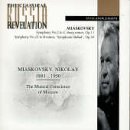| All Artists: Nikolay Miaskovsky, Evgeny Svetlanov, Gennady Rozhdestvensky, USSR Symphony Orchestra Title: Symphonies 2 & 22 Members Wishing: 0 Total Copies: 0 Label: Russian Revelation Release Date: 4/21/1998 Genre: Classical Styles: Historical Periods, Modern, 20th, & 21st Century, Symphonies Number of Discs: 1 SwapaCD Credits: 1 UPCs: 182478356824, 5032636100682, 503263610068 |
Search - Nikolay Miaskovsky, Evgeny Svetlanov, Gennady Rozhdestvensky :: Symphonies 2 & 22
 | Nikolay Miaskovsky, Evgeny Svetlanov, Gennady Rozhdestvensky Symphonies 2 & 22 Genre: Classical
|
Larger Image |
CD Details |
CD ReviewsA highly worthy compact disc of the works of A Great Soviet. David A. Hollingsworth | Washington, DC USA | 05/17/1999 (5 out of 5 stars) "Nikolay Yakovlevich Myaskovsky (1881-1950), the Musical Conscience of Moscow, was deemed by some as the greatest of Soviet symphonists. Listening to the symphonies nos 2 & 22 on this disc (and other symphonies I was lucky to obtain, especially on Melodiya recordings & Olympia re-issues of the original Melodiya recordings), there is no doubt that the music of Myaskovsky has substance & depth, although at places his ideas tend to be too plain & out of focus. However, Myaskovsky was a 20th Century Piotr Illyich Tchaikovsky, not as epigone, but as a man not afraid to express himself and @ the same time allow his listeners to understand him & his music. Truly an accomplishment during the Stalinist Era. Was Myaskovsky the greatest Soviet symphonist? Perhaps, although no less imporatnt than Dmitri Shostakovich.The symphony no. 2 (1910) relates to the early piano sonatas (namely nos 1-4) due to the influence of Scriabin. The first movement is daring & powerful, with despairing climaxes & the intensity of a Tchaikovsky or of a Mahler. The slow movement (where Myaskovsky wrote his most deeply feeling, memorable, beautiful, effective, music in almost all of his symphonies) relates to the slow movement of Lyatoshynsky's slow movement of his symphonies nos. 1 & 3 in its mystic themes, pseudo Scriabinian & Rachmaninovian emotionism & beauty. The movement is remarkably appealing & poetic. The last movement returns to where the first movement left off, with the same level of intensity & pessimism, with the sense of optimism trying to assert itself, only to be overcome by the anguish nature of this impressive, promising student work (completed while Myaskovsky attended the Moscow Conservatory of Music). The symphony no. 22 in B Minor "Symphonic Ballad" of 1941 was the first work completed in response to the Great Patriotic War (Soviet's name for World War II). It's cast in three interlinking, continuous movements, describing Myaskovsky's thoughts concerning the Nazis invasion upon Soviet Russia. This symphony was not set to describe the War (a contrast to Shostakovich symphony no. VII "Leningrad."), but was set to portray to emotional turmoil cause by war (like Prokofiev's 5th & 6th symphonies & his War sonatas (nos 6,7,& 8), Kabalevsky's 2nd string quartet & his 2nd piano sonata, Khachaturian's 2nd symphony, & so forth). The first movement is serene, beautiful, & peaceful, with disturbing, tragic passages. The ternary part second movement portrays profound sadness & sorrow: the first part an expression of grief, a depiction of an invasion in the middle section of the movement while the last part expresses grief even more profoundly & passionately. Again, with no pause, the last movement enters, pompous & proud in feelings expressed with such a passion that even Tchaikovsky would have appreciate it. Listening to the final bars of this symphony, although the War was to end by 1945, there's no doubt that Myaskovsky, as well as Shostakovich, had look forward to better & brighter days, at least for a while, until realizing that those days would not come soon. Myaskovsky & Shostakovich expressed that unfortunate yet necessary realization in their 24th & 8th symphonies respectively, the feelings of contemplations & uncertainty plaguing even their final passages.The performance of Gennadi Rozhdestvensky & his founded USSR (State) Ministry of Culture Symphony Orchestra performed with passion & conviction with every sense of sonority & emotionism embedded within the performance. The original tape recording, re-issued with adeguate opulance of sound & acoustics, is well done & tolerable. Yevgeny Svetlanov & the USSR State Symphony Orchestra likewise performed with passion & conviction with a more than appreciative re-issue of an original Melodiya LP recording. My hope is that this compact disc stays, undeleted, & always available, despite BMG's control over the re-issuance of the original Melodiya recordings.Profoundly & passionately recommended."
|

 Track Listings (4) - Disc #1
Track Listings (4) - Disc #1